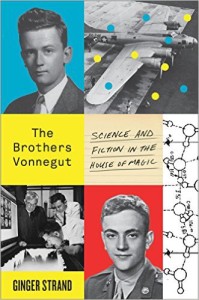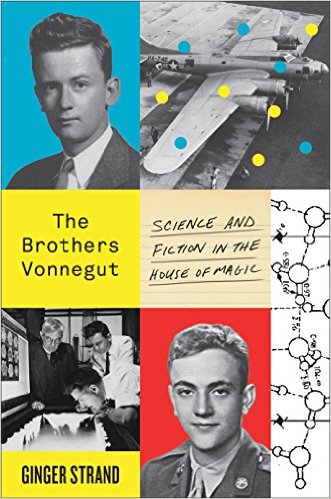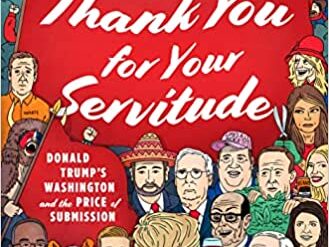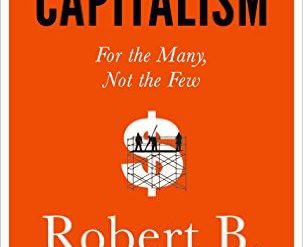
Four years ago a superb biography of Kurt Vonnegut called And So It Goes — Kurt Vonnegut: A Life by Charles J. Shields was published. Shields focused on his subject’s character, the ups and downs of his troubled inner life, and the rapidly shifting fortunes of his writing career. Now Ginger Strand has produced an equally engrossing book, The Brothers Vonnegut: Science and Fiction in the House of Magic, a dual biography of Kurt Vonnegut, the writer, with his older brother, Bernard, a brilliant scientist and inventor. The two books are very different. They complement each other.
Exploring the sources of Kurt Vonnegut’s fiction
Strand’s book is largely devoted to the brothers’ lives in the 1940s and 50s and is focused on exposing the roots of Kurt’s fiction. What stands out most clearly in her work is the powerful influence that Bernard played in Kurt’s life and his writing. Shortly after World War II, when Kurt moved to Schenectady, New York, to take a PR job at General Electric, he was following his older brother, who was employed as a research scientist at the then-famous GE Research Lab.
Kurt’s miserable years at GE, churning out press releases while he faced a torrent of rejection slips for his short stories, provided him with rich fodder for his novels. GE figured so obviously and in such an unfavorable light in his early fiction that no bookstore in Schenectady would carry his first novel, Player Piano. Many of the characters in his books were modeled after scientists and executives at GE, including Bernard himself. At times, even their names were similar.
The Brothers Vonnegut: Science and Fiction in the House of Magic by Ginger Strand ★★★★★
An equally powerful influence on Kurt’s writing was his first wife, Jane. They had been childhood sweethearts in Indianapolis. Though Kurt was a mediocre student who dropped out of Cornell after two years as a chemistry student and later abandoned the University of Chicago short of obtaining a degree in anthropology, Jane excelled at school. However, she too dropped out, to give birth to the couple’s first child in 1947. Though Shields emphasizes Kurt’s shabby treatment of his wife, Strand sees their relationship differently. It is clear in The Brothers Vonnegut that Kurt would never have persisted as a writer, much less succeeded, had it not been for Jane’s abiding faith in his genius and the many years during which she submerged her own considerable talents to support his instead.
The man who would control the weather
Bernard Vonnegut was marked for a brilliant career in science from an early age. At General Electric, he quickly came to the attention of the lab’s sole Nobel Prizewinner, Irving Langmuir. Along with Langmuir’s remarkable assistant, Vincent Schaefer, Bernard became a pioneer rainmaker. However, Langmuir and Schaefer focused on the use of dry ice to “seed” clouds and stimulate the production of snow and rain. Langmuir made wildly exaggerated claims for the effectiveness of dry ice.
He claimed that the lab’s efforts in seeding clouds had changed the weather on a continental scale, triggering floods and shifting hurricanes off course — much to the chagrin of GE’s top executives, who were on the receiving end of numerous lawsuits filed as a result. Langmuir’s claims notwithstanding, it was Bernard who discovered silver iodide as a catalyst, which proved to have far superior properties. That discovery has played the major role in rainmaking in later decades.
The prospect of changing weather patterns by conscious effort early came to the attention of the Pentagon. Over time, the military managed to co-opt GE’s research in the field, classifying most of their findings. Years later, it was discovered that “the CIA had been using cloud seeding as a weapon of war. Since 1966, U.S. planes had flown more than twenty-six hundred cloud-seeding missions over Indochina, spraying the clouds of Vietnam and Laos with aerosolized silver iodide.” That revelation led to a UN treaty that banned this practice in war.
The ethics of science
GE’s increasing closeness to the U.S. military became deeply troubling to both Vonnegut brothers. They had been raised as pacifists, and Kurt regarded himself as a socialist. Both had been emotionally involved with efforts in the 1940s to establish a world government that could assume control of all nuclear weapons. Though the advent of the Cold War and the anti-Communist witch-hunts of the 1940s and 50s soon scotched those efforts, both Bernard and Kurt remained convinced that marquee scientists such as Edward Teller and John von Neumann, as well as many of Bernard’s colleagues at GE, were tragically misguided in serving the military and the weapons industry.
Strand emphasizes the importance of these moral qualms in the lives of both brothers. For Bernard, it was a major factor in his decision to leave GE and, eventually, to turn to academia to avoid having to work for the Pentagon. For Kurt, the failure of scientists to be guided by moral precepts became a major theme in his novels, from Player Piano to Cat’s Cradle to Slaughterhouse-Five.
Did Kurt Vonnegut write science fiction?
As Strand tells the tale, Kurt had a love-hate relationship with science fiction. In the 1950s, when he was eagerly sending one story after another to unreceptive magazine editors, he seemed comfortable being called a science fiction writer: he was desperate for recognition of any sort. Later in life, once he was established as one of the leading writers of his time, he resisted the label. No wonder, since most of the public associates science fiction with spaceships and alien monsters. In fact, the field is rich with imaginative, brilliantly written tales that illuminate the human condition.
About the author
Wikipedia describes Ginger Strand as “an American essayist, novelist, environmental writer, and historian.” The Brothers Vonnegut is her third nonfiction book.
For more great reading
Like to read good biography? Check out Great biographies I’ve reviewed: my 10 favorites.
If you enjoy reading nonfiction in general, you might also enjoy:
- Science explained in 10 excellent popular books
- My 10 favorite books about business history
- Top 10 nonfiction books about politics
And you can always find my most popular reviews, and the most recent ones, on the Home Page.



























